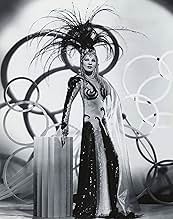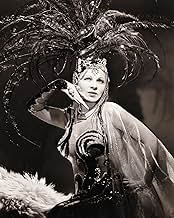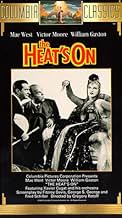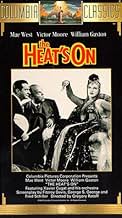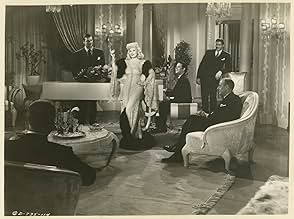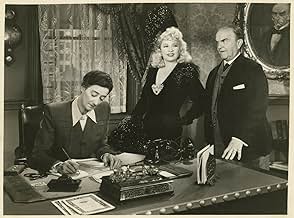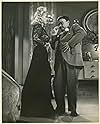When his biggest star joins a rival's show, a Broadway producer bluffs and schemes to get her back.When his biggest star joins a rival's show, a Broadway producer bluffs and schemes to get her back.When his biggest star joins a rival's show, a Broadway producer bluffs and schemes to get her back.
Leon Belasco
- Shore - the Agent
- (uncredited)
Beatrice Blinn
- Babette
- (uncredited)
Featured reviews
This mild little film is like untold dozens of minor musicals from the 1940's that were ground out by Columbia and Universal and pretty much forgotten and unseen since original release. What keeps this one in circulation is the fact that it top lines no less than Mae West, one of the cinema's greatest women stars. West was now on the eve of 50 when the movie was made, a good 20 years and then some older than most of the pinup girls that were packing in the moviegoers of the era. Presumably her limited options in Hollywood at the time persuaded to take a chance on this Gregory Ratkoff production. She took the project seriously enough to slim down, looking sensational in some gorgeous Walter Plunkett gowns and clearly spiced up some of her scenes with some uncredited but unmistakable original wisecracks. Alas, far too much time is given to musical numbers by other performers although glamorous black jazz artist Hazel Scott is fantastic in her productions. There is also perhaps a bit too much time given to the male leads, William Gaxton and Victor Moore, highly regarded Broadway stars of the era (co-stars in fact in four stage hits) but not actors who can carry a film. Even though the cast is talented and some of the musical numbers are quite good (I actually enjoyed Moore's comic number "They Never Look as Pretty as the Package"), you keep waiting for Mae West to appear on the scene again. I suspect this was true even in 1943 when her popularity was at a low point.
Mae West nevertheless manages to score some wonderful moments, notably the comic scene when Victor Moore comes up to see her sometime. Almost as good is West's confrontational scene with Moore's blue nose sister, character actress Almira Sessions. (It's interesting to note the film is one of the few times West is surrounded by performers older than herself, Gaxton, Sessions, and Moore have several years on her which may be part of the reason West looks fairly youthful in the movie in addition to being well-preserved). Starlet Mary Roche is featured as Moore's niece who longs for a show business career, her one musical number "Walbash" is actually quite pleasant but this is apparently her only film appearance, she later became a hairdresser in the film industry if that is indeed the same Mary Roche.
Some like it hot and this movie ain't so hot but we have so few Mae West movies to enjoy it is to be cherished in a way for another glimpse at one of America's great pop culture phenomenons.
Mae West nevertheless manages to score some wonderful moments, notably the comic scene when Victor Moore comes up to see her sometime. Almost as good is West's confrontational scene with Moore's blue nose sister, character actress Almira Sessions. (It's interesting to note the film is one of the few times West is surrounded by performers older than herself, Gaxton, Sessions, and Moore have several years on her which may be part of the reason West looks fairly youthful in the movie in addition to being well-preserved). Starlet Mary Roche is featured as Moore's niece who longs for a show business career, her one musical number "Walbash" is actually quite pleasant but this is apparently her only film appearance, she later became a hairdresser in the film industry if that is indeed the same Mary Roche.
Some like it hot and this movie ain't so hot but we have so few Mae West movies to enjoy it is to be cherished in a way for another glimpse at one of America's great pop culture phenomenons.
Broadway star Fay Lawrence (Mae West) wants out of her contract with producer Tony Ferris (William Gaxton). She can do it if the show does badly. A society foundation shuts them down and she jumps to rival Forrest Stanton. Tony is willing to do anything to get her back including using the same foundation and its hapless vice president Hubert Bainbridge (Victor Moore) who wants to help his niece's performing ambitions.
This is Mae West's last theatrical release before making a semi-return some three decades later. She delivers her style of comedy with less sexuality. There is some music. The songs may be appealing to some. For most of this, the lead character is actually Ferris. He's not that compelling or appealing with all his scheming. If this was written by Mae West, she would probably be the lead from the start. She does take over in the last act and that's a good section. If only the movie has more of those.
This is Mae West's last theatrical release before making a semi-return some three decades later. She delivers her style of comedy with less sexuality. There is some music. The songs may be appealing to some. For most of this, the lead character is actually Ferris. He's not that compelling or appealing with all his scheming. If this was written by Mae West, she would probably be the lead from the start. She does take over in the last act and that's a good section. If only the movie has more of those.
An attempt to remake a wartime musical in the old Busby Berkeley style. But Mae West was 50 years old and barely moves or sings; her sharp tongue has also seen better days. Better still is Victor Moore, who, despite his 67 years old, is much more entertaining and active than the popular diva.
The other saving graces are the appearances of singers Joana Thorsen and especially Hazel Scott, not to mention the participation of Xavier Cugat and, above all, his Cuban jazz orchestra, giving the film a picturesque touch.
A weak script, a lightweight, low-budget production, far from the extravagances of Busby Berkeley, this film is mere cheap entertainment, meant to distract viewers during the difficult times of war.
Also noteworthy is the appearance of a young Lloyd Bridges, in a supporting role.
The other saving graces are the appearances of singers Joana Thorsen and especially Hazel Scott, not to mention the participation of Xavier Cugat and, above all, his Cuban jazz orchestra, giving the film a picturesque touch.
A weak script, a lightweight, low-budget production, far from the extravagances of Busby Berkeley, this film is mere cheap entertainment, meant to distract viewers during the difficult times of war.
Also noteworthy is the appearance of a young Lloyd Bridges, in a supporting role.
It took three credited screenwriters to come up with this flaccid comedy-musical from Columbia--and not one of them apparently had a sense of humor. Perhaps taking a page from Mae West's real-life tangles with the censors, the bawdy, naughty comedienne is toned way down here in a plot about a musical stage performer who finds herself stuck in a bomb and blames her manager; he gets a bright idea and has the show raided for indecency to drum up business, but the gag goes too far and the show is closed for good. At this point, the foolish scenarists practically lose track of Mae, which is the most indecent thing about the picture! She pops up intermittently, talking on the phone or sitting idly in the theater, but all her charm and smarm has been extinguished (she retired from films for twenty-seven years after this). The manager weasels show money out of a good-natured schnook and puts on a new revue (a nice wholesome one)--and even gets West back in the spotlight--but it's too late. The movie has collapsed around everyone like an exhausted house of cards. *1/2 from ****
Although Mae West receives first billing, she is not on screen long enough to make this misfire worth seeing. Even when she is on display and looking svelte and glamorous at 50, her lines lack the double-entendres and sly delivery of her best work. The silly goings on in this back-stage "comedy" revolve around financing a theatrical production with money from a blue-nose group whose goal is to suppress such shows. The plot is muddled at best, ridiculous at worst, and the cast lacks either a romantic lead such as Cary Grant or a comic like W.C. Fields for Miss West to play off. The production numbers for the most part are forgettable, even when Mae West delivers the songs. The one exception is the dazzling piano playing by Hazel Scott. Her number with two pianos is nothing short of astonishing and almost makes the dreck one has to endure before her appearance almost bearable. Unfortunately, Scott has only two numbers, but mercifully the film ends rather abruptly not long after she exits the screen. "The Heat's On" is certainly an ironically mis-titled film considering the heat that West generated in her early work, and the movie is only for die-hard West fans who are interested in seeing everything that she appeared in. Entertainment seekers and non-West fans beware.
Did you know
- TriviaThis was Mae West's final film until Myra Breckinridge (1970) 27 years later.
- GoofsOn a wall of a producer's office is a presumably old publicity shot of Fay wearing an elaborate headdress that she doesn't actually wear until she performs a musical number later in film for an entirely new production staged by rival producer.
- Quotes
Fay Lawrence: [singing] If you want things put in order, Come and see me south of the border...
- SoundtracksI'm Just a Stranger in Town
(1943)
Music by Jay Gorney
Lyrics by Henry Myers and Edward Eliscu
Copyright 1944 by Mills Music Inc.
Performed by Mae West (uncredited) in the show "Indiscretions"
Details
- Release date
- Country of origin
- Languages
- Also known as
- Sinfonías dislocadas
- Production company
- See more company credits at IMDbPro
- Runtime
- 1h 19m(79 min)
- Color
- Aspect ratio
- 1.37 : 1
Contribute to this page
Suggest an edit or add missing content

